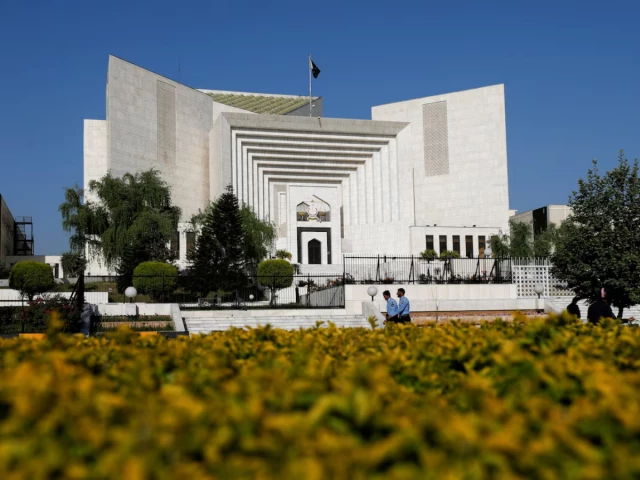The Supreme Court proposes tougher penalties for unregistered marriages in its report Redefining Access to Justice 2025
Police officers walk past the Supreme Court of Pakistan building in Islamabad, Pakistan April 6, 2022. REUTERS
The Supreme Court has outlined key family law reforms, including revising the Nikah Nama to include a column for dowry articles and proposing tougher penalties for unregistered marriages, as part of its wider justice reform agenda outlined in its report Redefining Access to Justice 2025.
During the family law reforms, the apex court has recommended clearly defining key terms like “maintenance” and “dowry” in the Muslim Family Law Ordinance (MFLO) 1961 to remove ambiguities that often lead to inconsistent judgments in family courts. The reforms also propose tougher penalties for unregistered marriages to strengthen women’s legal protection and ensure accountability in matrimonial matters.
The report further suggests allowing transfer of family court cases to the Islamabad Capital Territory (ICT) to streamline case management and improve cross-jurisdictional case management.
The Redefining Access to Justice 2025 report highlights that the family law reforms are part of an inclusive law reform process involving senior lawyers, judges and the Law Reform Advisory Committee, which guides several legal modernization initiatives.
Alongside legal reforms, the Supreme Court has also prioritized digital transformation to increase transparency and public accessibility. More than 16,000 e-records, 7,200 e-statements and over 24,000 certified copies have been electronically processed across registries, while 54,473 judgments have been digitized for archival purposes with QR code authentication and NADRA integration for verified identification.
A National Judicial Information Dashboard now provides real-time monitoring of cases, and a public facilitation system – including an online feedback portal, anti-corruption hotline and information centers – has been launched to strengthen citizen engagement.
Through these judicial and digital reforms, the Supreme Court aims to build a judicial system that is transparent, accessible and responsive to contemporary social realities.



